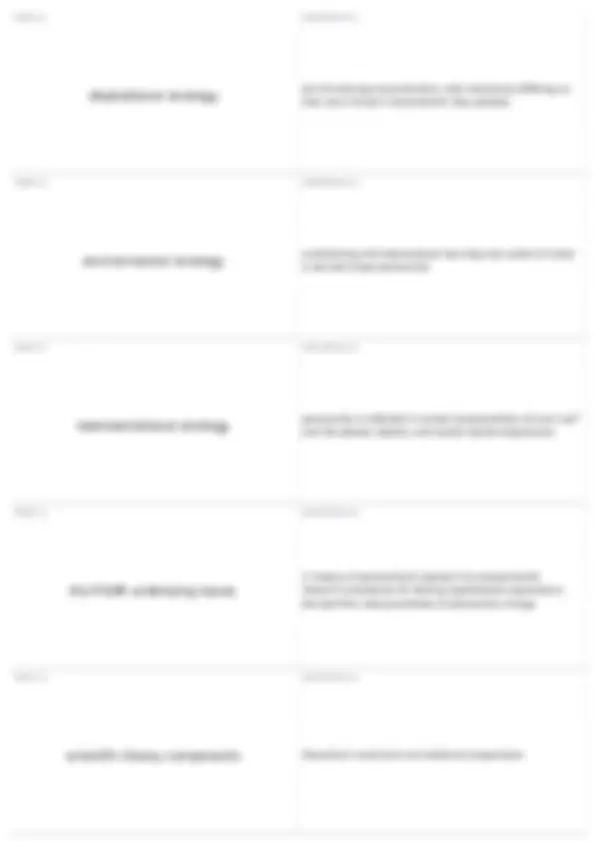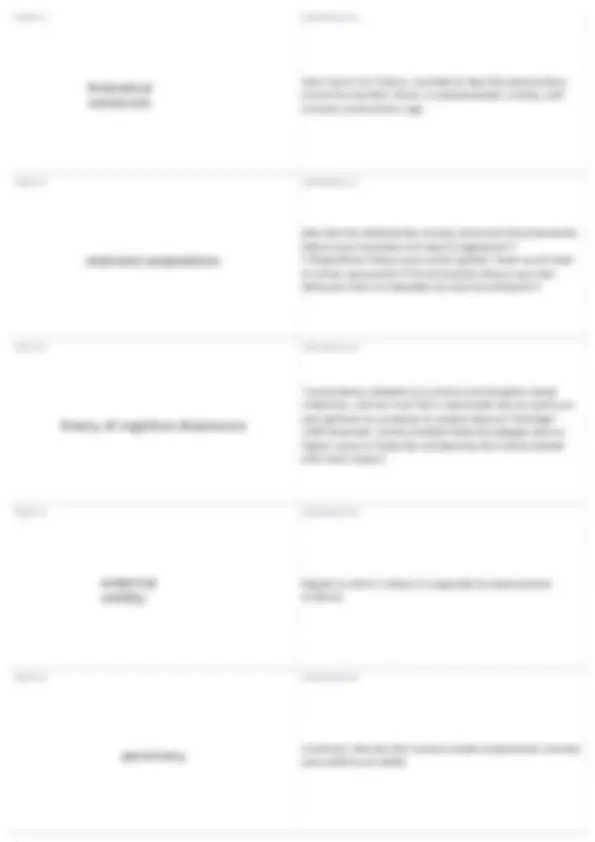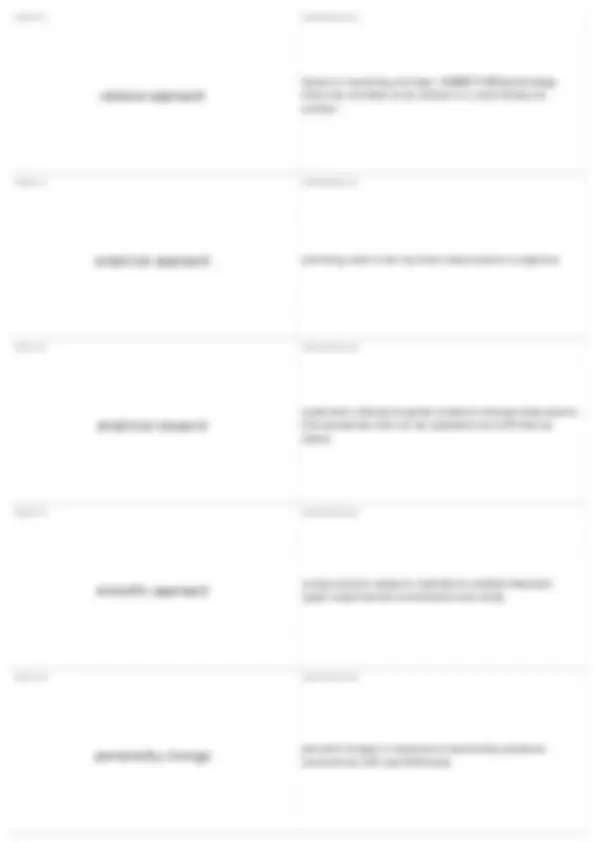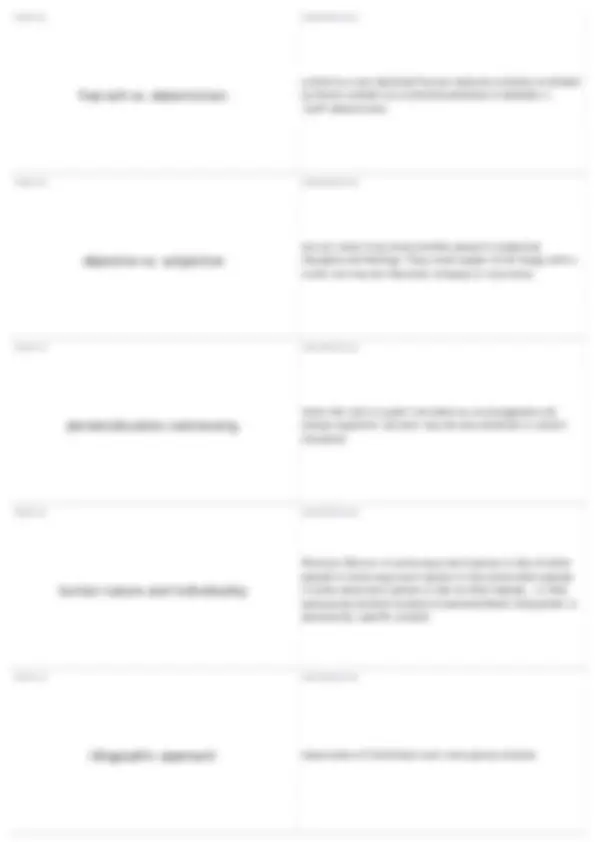








Study with the several resources on Docsity

Earn points by helping other students or get them with a premium plan


Prepare for your exams
Study with the several resources on Docsity

Earn points to download
Earn points by helping other students or get them with a premium plan
Community
Ask the community for help and clear up your study doubts
Discover the best universities in your country according to Docsity users
Free resources
Download our free guides on studying techniques, anxiety management strategies, and thesis advice from Docsity tutors
Personality: Strategies & Issues (Liebert & Spiegler, 8th Edition) Class: PPE 4003 - Theories of Personality; Subject: Personality; University: University of North Florida; Term: Fall 2012;
Typology: Quizzes
1 / 11

This page cannot be seen from the preview
Don't miss anything!







In Ancient Rome, actors wore masks that often reflected their character TERM 2
DEFINITION 2 scientific study of personality using social, developmental, abnormal, experimental, and cognitive psychologies TERM 3
DEFINITION 3 unique dynamic organization of characteristics of a particular person, physical and psychological, which influence behavior and responses to the social and physical environment TERM 4
DEFINITION 4 personality is the dynamic organization within the individual of those psychophysical systems that determine his/hers unique adjustments to his/hers environment TERM 5
DEFINITION 5 personality is that which permits prediction of what a person will do in a given situation. It is concerned with ALL the behavior of the individual, both overt and under the skin
personality is the more or less stable and enduring organization of a person's character, temperament, intellect, and physique, which determines his unique adjustment to his environment TERM 7
DEFINITION 7 personality is the relatively enduring pattern of interpersonal situations which characterize human life TERM 8
DEFINITION 8 within the same theoretical framework TERM 9
DEFINITION 9 four major theoretical orientations to personality psychology:-Psychoanalytic-Dispositional-Environmental- Representational TERM 10
DEFINITION 10 personality driven by one or two driving forces or underlying forces that motivate all human behavior
basic terms of a theory; invented to describe observations, cannot be touched, heard, or seenexamples: anxiety, self- concept, extraversion, ego TERM 17
DEFINITION 17 describe the relationships among constructs("psychoanalytic theory says frustration will lead to aggression") ("dispositional theory says similar genetic make-up will lead to similar personality")("environmental theory says that behaviors that are rewarded are hard to extinguish") TERM 18
DEFINITION 18 "inconsistency between our actions and thoughts create imbalance, and we must find a reasonable way to justify our own behavior to ourselves to restore balance" Festinger (1957)example: harshly treated fraternity pledges place a higher value on fraternity membership than those treated with more respect TERM 19
DEFINITION 19 degree to which a theory is supported by observational evidence TERM 20
DEFINITION 20 simplicity; theories that involve simpler explanations and less assumptions are better
the breadth of the phenomena that a theory encompasses; the more it can account for, the better a theory it isno personality theory has yet been able to encompass the entire field TERM 22
DEFINITION 22 degree to which the assumptions and propositions fit together into a larger explanation TERM 23
DEFINITION 23 how easily a theory can be supported or refuted through research TERM 24
DEFINITION 24 techniques for inducing personality change provide a measure of the practical usefulness of personality theories TERM 25
DEFINITION 25 must be known and taken seriously by othersexample: in as early as 3rd century B.C, the theory that the sun was the center of the solar system had been proposed, but it wasnt until the enlightenment that it was taken seriously when Copernicus proposed it; (i.e. timing and social/public mentality is key)
value judgements that differ from the norm TERM 32
DEFINITION 32 how other people view you is important to personality but blurs the line between objective judgement and mere opinion TERM 33
DEFINITION 33 advantage of being able to confirm objectively through archives TERM 34
DEFINITION 34 exisiting rate of occurrence within a population TERM 35
DEFINITION 35 explaining the nature and purpose of the research and any deception involved
based on reasoning and logic, SUBJECTIVEDisadvantage: what one considers to be rational is a mere fantasy to another TERM 37
DEFINITION 37 admitting what is fact by direct observationit is objective TERM 38
DEFINITION 38 systematic attempt to gather evidence through observations and procedures that can be repeated and confirmed by others TERM 39
DEFINITION 39 using empirical research methods to validate theories types:-experimental-correlational-case study TERM 40
DEFINITION 40 planned changes in response to personality problems; synonymous with psychotherapy
delineating general rules and laws that apply to all people; the ingredient approach TERM 47
DEFINITION 47 measuring and communicating about important personality dimensions TERM 48
DEFINITION 48 anticipating the likelihood of occurrence of various behaviors TERM 49
DEFINITION 49 influencing behavior TERM 50
DEFINITION 50 comprehension of or the the ability to explain a process